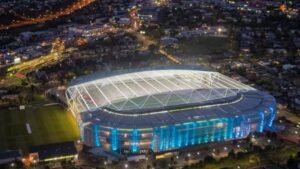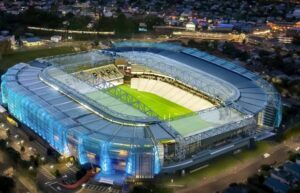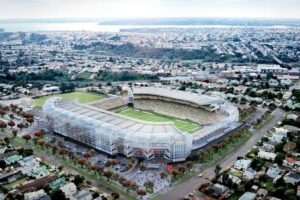BREAKING NEWS: New Zealand Unveils $1.3 Billion Eden Park Renovation, Redefining the Future of Football
Auckland, NZ — In a landmark move set to redefine the sporting landscape in the Southern Hemisphere, New Zealand today unveiled plans for a staggering $1.3 billion transformation of Eden Park, Auckland’s iconic national stadium. Billed as the most ambitious stadium redevelopment in the nation’s history, the project promises to elevate Eden Park into one of the most technologically advanced, multi-sport arenas in the world — and to secure its position as the beating heart of New Zealand football for decades to come.
A Vision of the Future
The announcement was made at a packed press conference inside Eden Park itself, where Prime Minister Christopher Luxon, Auckland Mayor Wayne Brown, and Eden Park Trust CEO Nick Sautner stood shoulder-to-shoulder before an audience of reporters, players, and fans.

“This is more than just a stadium upgrade,” said Sautner. “It’s a statement — a commitment to making New Zealand the home of world-class football experiences.”
The sweeping redevelopment plan will see Eden Park’s seating capacity expand from 50,000 to a flexible 80,000-seat configuration for major international matches, while maintaining intimacy for smaller fixtures through retractable lower tiers. Every seat will offer unobstructed, high-definition sightlines thanks to a full re-engineering of the bowl’s geometry.
—
Cutting-Edge Technology Meets Kiwi Ingenuity
At the heart of the upgrade is a state-of-the-art retractable roof — a lightweight, transparent structure capable of closing in under six minutes, allowing matches to proceed regardless of Auckland’s famously unpredictable weather.
Underneath the pitch, a revolutionary hybrid grass-and-synthetic surface will be installed, using smart moisture sensors and climate-controlled airflow to maintain perfect playing conditions year-round.
Fans will enjoy 5G-powered augmented reality features, enabling them to stream instant replays, access live player stats, and even order food and drinks to their seats via a custom Eden Park app. AI-driven crowd management systems will guide spectators to the quickest entrances, bathrooms, and concessions in real time.
—

A Football-Centric Redesign
While Eden Park has long hosted rugby, cricket, and concerts, the new layout is being purpose-built with football in mind. Adjustable lower stands will move closer to the field for FIFA-standard dimensions, creating a cauldron-like atmosphere for All Whites internationals, A-League fixtures, and potential FIFA World Cup matches.
The stadium will also include dedicated training pitches, player recovery suites, and a high-performance football research centre in partnership with New Zealand Football and local universities.
—
Sustainability at the Core
Sustainability is a central pillar of the $1.3 billion plan. The roof’s transparent panels will be fitted with next-generation solar film, capable of generating enough renewable energy to power the stadium on match days and feed surplus electricity back into Auckland’s grid. Rainwater harvesting systems will supply irrigation for the pitch and surrounding green spaces, while zero-waste concessions will ensure all food and packaging is compostable or recyclable.
Eden Park’s carbon footprint is projected to shrink by over 60% within the first five years of operation.
—
Boosting the Economy & Global Profile
Economic projections suggest the redevelopment could inject over $4 billion into the New Zealand economy over the next 20 years, driven by tourism, major event hosting, and year-round utilisation of the venue. Officials are already in talks with FIFA, the Asian Football Confederation, and leading European clubs to bring marquee matches and tournaments to Auckland once the stadium reopens.
Mayor Wayne Brown called it “a catalyst for Auckland’s global positioning,” adding that it would “cement our place on the international sporting map.”
—

Funding & Timeline
The $1.3 billion budget will be met through a combination of central government investment, Auckland Council contributions, private sponsorships, and long-term commercial naming rights — a deal that insiders say could be worth over $150 million alone.
Construction is set to begin in late 2026, following the completion of the City Rail Link, which will give fans a direct eight-minute train ride from the city centre to the stadium gates. The new Eden Park is scheduled to host its first match in 2030, with the grand opening rumoured to feature a blockbuster New Zealand vs. England football friendly.
—
Fan Reactions
Reaction from fans has been overwhelmingly positive. Supporters’ groups have praised the project’s football-first design and technological enhancements, while some remain cautious about the scale of investment.
“If they can pull this off without ticket prices going through the roof, it could be the best thing to happen to New Zealand football,” said long-time All Whites supporter Mereana Rangi.
—
The Final Word
From its humble beginnings as a suburban sports ground to its current status as New Zealand’s premier stadium, Eden Park has always evolved with the times. This $1.3 billion redevelopment represents its boldest leap yet — a fusion of architectural ambition, sporting excellence, and community vision.
As Prime Minister Luxon summed it up: “This is not just about building a stadium. It’s about building the future of football in New Zealand.”













